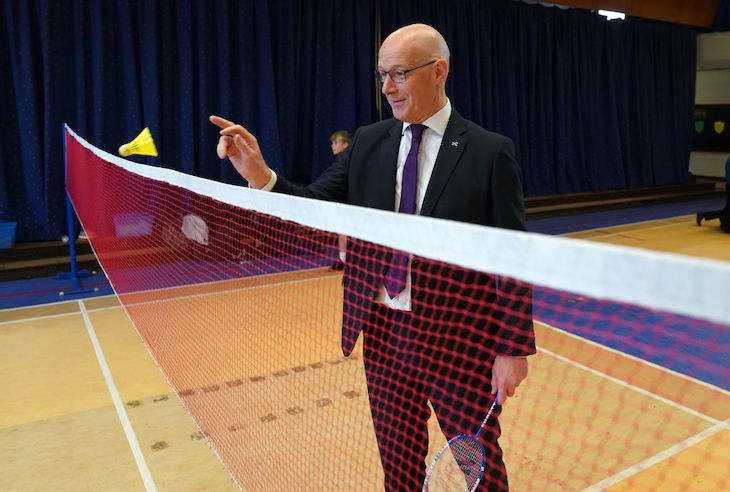Humza Yousaf lasted just over 400 days as SNP leader. Will his replacement John Swinney get that far? The question arises so soon into his tenure because of Swinney’s decision to oppose the suspension of a former cabinet colleague. Michael Matheson resigned as health secretary in February after the taxpayer was left with an £11,000 bill for iPad data usage incurred while he was on a family holiday in Morocco. After initially claiming ignorance as to how the bill was run up, Matheson later claimed that his sons had hotspotted the data to watch football matches. Yousaf stood by Matheson, calling him a ‘man of integrity’, a locution the opposition seized on to accuse the SNP hierarchy of putting mates before rules.
Instead of moving on from yet another SNP financial row, Swinney chose to back Matheson
Yousaf’s departure and Swinney’s arrival, marked by copious reference to his self-cultivated nickname ‘Honest John’, was an opportunity for the party to put the scandal behind them. The Scottish Parliament Corporate Body having found Matheson culpable for four breaches of the MSP code of conduct, yesterday’s announcement by the Standards Committee of its recommended sanctions should have drawn a line under the matter. The committee recommended a 27-day suspension from parliament and docking Matheson’s salary by 54 days, the harshest punishment ever proposed.
But instead of grabbing the chance to move on from yet another SNP financial row, Swinney has chosen to back Matheson, who he freely admits is a personal friend, and says he will oppose the sanction. Speaking at First Minister’s Questions, Swinney attacked the integrity of the process, saying a member of the committee, Conservative MSP Annie Wells, had made ‘prejudicial comments’ about Matheson that should have excluded her. Specifically, Wells said Matheson’s ‘desperate efforts to justify his outrageous expenses claim have been riddled with lies, cover-ups and the need for us all to suspend our disbelief’. Swinney claimed that ‘the integrity of the parliament has been brought into question’ by Wells’ failure to recuse herself and the ‘unfair process’ it led to. His concern is as much arithmetical as ethical: since the collapse of the coalition with the Greens, the SNP is a minority administration in which every vote counts. Taking Matheson out of the equation for a month hinders the government’s ability to survive votes.
Whether or not Swinney has a point about procedural propriety, his decision to stand by his mate is an extraordinary gamble in the run-up to a general election. The SNP had hoped to spend the next six weeks hammering away at the Tories’ incompetent management of the country and the economy while framing Labour as a pale imitation. Instead, Nationalist candidates can expect furious doorstep interrogations about five-figure iPad bills, parliamentary expenses and SNP politicians being above the rules. To make matters worse, Police Scotland chose yesterday as the day to submit their prosecution report on Peter Murrell, former SNP chief executive and husband to Nicola Sturgeon. Murrell was recently charged with embezzlement by officers investigating the fate of £660,000 in party donations.
The Nationalists were already facing a difficult general election. They have been sliding in the polls since Sturgeon’s departure, with Yousaf’s error-prone leadership, rows over gender policy, and the failure to deliver independence contributing to supporter malaise. But what is really hurting them is that, after 17 years running Scotland’s powerful devolved government, they have almost nothing to show for it, or at least nothing positive. Polls suggest voters are finally beginning to blame the party for its government’s unimpressive record on health, education, transport and climate. Those are matters more relevant to a devolved election, but in happier times the SNP was expert at directing public sentiment on reserved matters into devolved elections and vice versa.
Just as unhelpful has been Labour’s long-awaited and extremely gradual revival north of the border. After trailing the SNP in every opinion poll for a decade, Labour is now ahead – by up to ten points in the latest YouGov. Sir Keir Starmer’s party, led in Scotland by Anas Sarwar, is poised to recover both its old working-class vote in the former industrial heartlands of Glasgow and the west and the middle-class professional vote which began to drift SNP-wards in 2007. If Labour can solidify these trends, it could cost the SNP as many as half of its 43 seats. To add to the agony, the hitherto beleaguered Scottish Tories are hopeful about gaining SNP redoubts in the North East amid discontent with the Scottish government’s decision to turn its back on North Sea oil.
All that was more than enough to be contending with. Now Swinney has foisted upon his Westminster candidates a very difficult conversation with the voters about parliamentary expenses and standards. Labour and the Tories will spend the next six weeks making those candidates pay the price for Swinney’s decision, and that price could be a heavy one. By the time Swinney replaced Yousaf, the party was bracing itself for the loss of up to 20 seats. If Swinney exceeds that number, and he very well might, his own leadership will come into question. With a Holyrood election due in 2026, the Nationalists are fighting to cling onto power they have enjoyed for a generation. Another leadership contest would leave the SNP looking as chaos-ridden as the Truss-era Tories, but there are young turks who believe their time is imminent. They do not wish to spend it on the Holyrood opposition benches. Should Swinney prove to be a loser in July, it may be the last election he leads the SNP into.








Comments